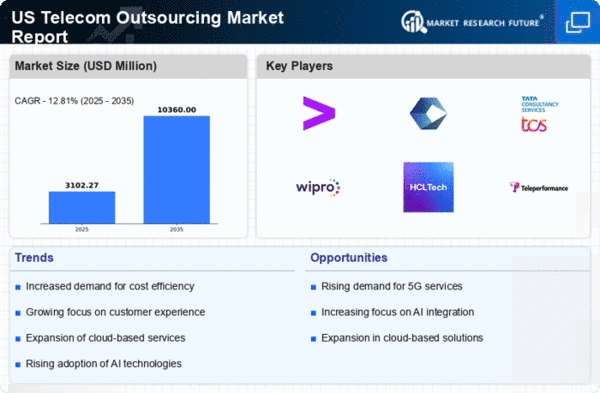Increased Regulatory Pressures
The telecom outsourcing market is facing heightened regulatory pressures that are influencing operational strategies. Compliance with data protection laws and industry regulations is becoming increasingly complex, prompting telecom companies to outsource certain functions to specialized providers. This trend is particularly evident in areas such as data management and cybersecurity, where expertise is crucial. The telecom outsourcing market is likely to see a rise in demand for services that ensure compliance and mitigate risks associated with regulatory non-compliance. As companies navigate these challenges, the outsourcing of compliance-related functions is expected to grow, potentially leading to a market expansion of around 15% in the coming years.
Growing Demand for Cost Efficiency
The telecom outsourcing market is experiencing a notable surge in demand for cost efficiency among service providers. Companies are increasingly seeking to reduce operational expenses while maintaining service quality. Outsourcing non-core functions allows telecom operators to focus on their primary business objectives. According to recent data, outsourcing can lead to cost reductions of up to 30%, which is particularly appealing in a competitive landscape. This trend is likely to continue as firms strive to enhance profitability and streamline operations. The telecom outsourcing market is thus positioned to benefit from this growing emphasis on financial prudence, as businesses look for ways to optimize their expenditures without compromising on service delivery.
Focus on Enhanced Customer Engagement
The telecom outsourcing market is increasingly focused on enhancing customer engagement as a key driver of growth. Companies are recognizing that superior customer service is essential for retaining clients and attracting new ones. Outsourcing customer support functions allows telecom operators to provide 24/7 service and access to specialized expertise. This approach not only improves customer satisfaction but also reduces operational burdens on in-house teams. The telecom outsourcing market is likely to benefit from this trend, as businesses invest in outsourcing solutions that enhance customer interactions. With customer experience becoming a competitive differentiator, the market is expected to grow significantly, with estimates suggesting an increase of approximately 12% in the next few years.
Shift Towards Flexible Business Models
The telecom outsourcing market is witnessing a shift towards more flexible business models, driven by the need for agility in service delivery. Companies are increasingly adopting hybrid outsourcing strategies, combining onshore and offshore resources to optimize their operations. This flexibility allows telecom operators to scale their services according to demand fluctuations, thereby enhancing responsiveness to market changes. The telecom outsourcing market is adapting to this trend, as businesses recognize the importance of being able to pivot quickly in a dynamic environment. This adaptability is expected to foster growth, with many firms exploring partnerships that offer both cost savings and operational flexibility.
Technological Advancements Driving Innovation
Technological advancements are playing a pivotal role in shaping the telecom outsourcing market. The integration of artificial intelligence (AI), machine learning, and automation is transforming how telecom services are delivered. These technologies enable providers to enhance operational efficiency and improve customer service. For instance, AI-driven analytics can optimize network performance and predict maintenance needs, potentially reducing downtime. The telecom outsourcing market is likely to see increased investment in these technologies, as companies aim to leverage innovative solutions to stay competitive. As a result, the market is expected to grow, with projections indicating a compound annual growth rate (CAGR) of around 10% over the next few years.

















Leave a Comment